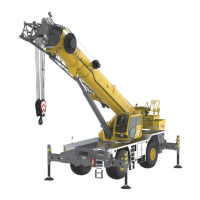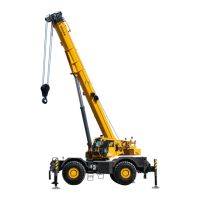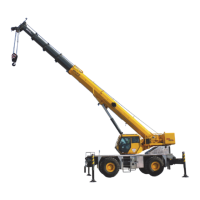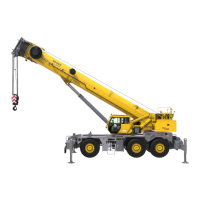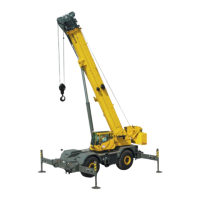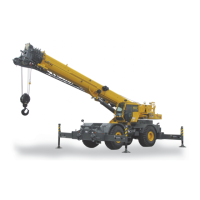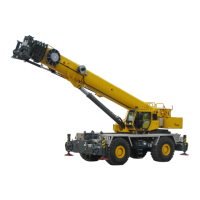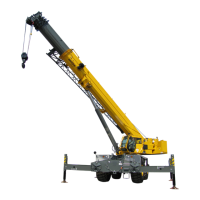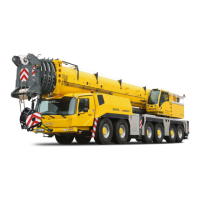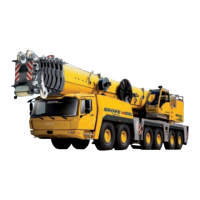Do you have a question about the Manitowoc Grove GRT8100 and is the answer not in the manual?
Provides overview of the crane's general features and operational context.
Details on how to contact Grove distributors for assistance with parts, service, and warranty.
Presents noise and vibration level test results for the crane operator position.
Identifies the locations on the crane where serial numbers are stamped or displayed.
Details technical specifications for general, dimensions, capacities, engine, axles, brakes, and other crane components.
Describes the specifications for hydraulic pumps #1, #2, and #3, including type, sections, and output.
Provides drum dimensions, cable specifications, line pull, speed, and motor displacement for hoists.
Identifies and lists various components of the crane with corresponding item numbers.
Covers safety messages, operator qualifications, and the importance of understanding manuals and decals.
Explains the function and limitations of operational aids like RCL systems, anti-two-blocking, and working area limiters.
Details on ensuring crane stability, using load charts, work site conditions, and proper lifting procedures.
Guidelines for operating in windy conditions, including wind speed limits and capacity reduction factors.
Critical safety procedures for operating near electrical power lines, including clearance distances and emergency actions.
Procedure for grounding the crane to prevent static electricity buildup.
Requirements and precautions for using the crane to lift personnel.
Inspection, maintenance, and safe usage guidelines for wire rope and synthetic hoist rope.
Procedures for safe maintenance of batteries and super capacitors, including cold weather considerations.
Covers general maintenance, fueling, engine checks, and procedures for transporting the crane.
Safe practices for traveling the crane, including road regulations, slope operation, and handling of loads during travel.
Guidelines for personal safety, crane access, and preparing the work site and crane before operation.
Identifies and describes the main controls and indicators found within the crane cab.
Details the steering column's tilt and telescoping features, and associated control levers and switches.
Explains the operation of the turn signal lever, windshield wiper/washer, headlight, and horn controls.
Describes the function of the drive axle selector and hazard lights switches for vehicle operation.
Explains the use of the increment/decrement switch for RPM control and the ignition switch for starting the engine.
Details the operation of the transmission shift lever for selecting gears and drive modes.
Covers controls located in the overhead console, including skylight, dome light, fan, and window latches.
Explains the function of switches on the overhead panel, including wiper, heater/AC, work lights, and engine cleaning.
Details the control seat, its adjustment features, and the main joysticks for boom lift, hoist, swing, and telescope.
Describes various switches like enable, bypass, and emergency stop, as well as foot pedal controls for crane functions.
Explains the CCS display, menu navigation, and the function of control buttons and the jog dial.
Details the RCL system, mode of operation, and setup screens for outrigger, telescope, and counterweight configuration.
Explains how to define and enable height, boom, radius, swing, and virtual wall limitations using the WRL.
Describes the ECO mode's function in controlling throttle command to reduce fuel consumption.
Overview of installing hoist cable, reeving, and erecting/stowing boom extensions.
Instructions for setting up the hoist platform in travel and working positions.
Step-by-step guide for installing the cable on the hoist drum, including securing the wedge.
Procedures for locking (disabling) and unlocking (enabling) the A2B switch when using boom extensions.
Ensures proper connection of electrical components for the RCL system and A2B switches before operation.
Details on reeving hoist rope over the boom, including single and multi-part line configurations.
Instructions for correctly installing and using wedge socket assemblies to terminate wire ropes.
Step-by-step procedures for erecting and stowing bi-fold boom extensions, including manual and hydraulic offsets.
Guides for installing and setting manual offsets for the 3.05 m (10 ft) heavy duty boom extension.
Specific procedures and safety warnings for performing tilt-up panel lifts using the heavy duty boom extension.
Instructions for installing, removing, and adjusting the counterweight and optional slab using control panels.
Covers general lubrication importance, waste disposal, and environmental protection guidelines.
Details standard and cold weather lubricants, intervals, and approved specifications for various crane components.
Recommends protecting exposed cylinder rods with Boeshield® T-9 to prevent corrosion.
Guidance on lubricating wire rope during its life and referring to service manual for detailed inspection.
Highlights lubrication points, frequency, and recommends using CraneLUBE lubricants for crane reliability.
Information on accessing Cummins' program for approved engine oils meeting specific engineering specifications.
Details lubrication points, capacities, intervals, and applications for transmission, torque converter, and filters.
Specifies lubrication points, approved lubricants, capacities, and intervals for steering and suspension components.
Provides instructions for checking and filling differential and planetary hub/wheel bearing oil levels.
Details lubrication points, intervals, and application methods for the turntable gear box, gear, and bearing.
Specifies lubrication for tilt cylinder pivot pins and pillow blocks.
Details lubrication for outrigger wear pads and beams.
Specifies lubrication for the lower lift cylinder pin.
Details lubrication points for hook block, overhaul ball, and various wear pads on boom sections.
Provides instructions for checking and filling oil levels for main and auxiliary hoists, and lubricating cable rollers and bearings.
Covers hydraulic oil inspection, filter changes, and environmental considerations for hydraulic systems.
Explains factory rust protection and owner responsibilities for maintaining paint finish against corrosion.
Guidelines for washing the crane, cleaning spots, and using compressed air for drying.
Recommends inspecting for damage after cleaning and procedures for touching up scratches and minor damage.
| Maximum Tip Height | 73.2 m (240.1 ft) |
|---|---|
| Engine Power | 250 hp |
| Engine | Cummins QSB6.7L |
| Engine Model | Cummins QSB6.7L |
| Drive Configuration | 4x4x4 |
| Maximum Lift Capacity | 100 tons |
| Maximum Boom Length | 47 m (154.3 ft) |
| Main Boom Length | 154 feet |
| Boom Length | 154 feet |
| Maximum Travel Speed | 16 mph |
